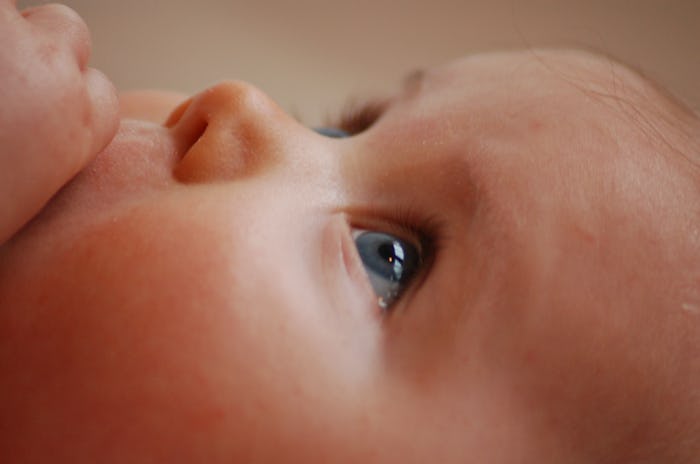When you're a new mom, everything is, well, new. You probably have a laundry list of worries on your mind and wondering if your baby is getting enough milk is top on your list. If you're breastfeeding, it's hard to gauge the exact amount of milk your baby is getting, but there are some signs that your baby isn't getting enough milk to be on the lookout for, especially in those first few weeks.
If you do notice any of these signs, it's best to call your doctor or lactation consultant so that they can help you get the problem cleared up right away. Obviously, it's of the utmost importance that your child gets enough milk. You don't need to loose the few precious hours of sleep you do have worrying about it, though. If you're keeping an eye on your baby's growth and the other signs of a healthy, breastfed baby, you will be able to tell if there is something wrong with your supply or your baby's latch.
Though the newness of a baby can be overwhelming, don't spend your day's fretting about what may be wrong. Instead, look for sure signs, ask for help, and enjoy your tiny bundle, because, yes, they do grow up too fast.
1Your Nursing Sessions Are Very Short Or Extremely Long
Some moms report extra long — over one hour — or extra short — less than five minutes — nursing sessions. According to Healthy Children, these extra long or short sessions may be a sign that your child isn't getting enough milk. Listen to see if you can hear you baby swallowing consistently. If not, there may be a problem with baby's latch or a low milk supply.
2Your Baby Isn't Gaining Weight
Though it's normal for babies to loose a little bit of weight in the days after birth, Dr. Sears noted that by around three or four weeks, your baby should have gained about four to seven ounces and surpassed its birth weight. After this phase, it's normal for babies to gain about one to two pounds per month. If you're concerned your baby isn't gaining weight quickly enough, be sure to ask your health care provider.
3Your Baby Isn't Producing Enough Wet Or Dirty Diapers
When your baby is still a newborn, most doctors will recommend that you count the number of wet and dirty diapers per day. This helps you know if your baby is getting enough to eat. For about the first five days, your baby should produce about three wet and three dirty diapers. After that, it's normal for a baby to have six or more wet diapers and around three dirty ones.
4Your Milk Hasn't Come In Yet
Though your body has been producing colostrum since your pregnancy, your breastmilk won't fully come in for about three or four days postpartum. Baby Center noted that if you haven't noticed an increase in milk supply by this time, notify your doctor or lactation consultant.
5Your Breasts Are Severely Engorged
Severe engorgement, besides being painful, could be a sign that your breasts aren't being properly drained after a feeding. Although engorgement is a normal part of breastfeeding, La Leche League noted that if it persists or becomes extreme (mastitis), try seeking the help of a lactation consultant.
6Pain Gets In The Way Of A Proper Latch
Nipple soreness and engorgement can make breastfeeding very painful in some cases. If you're experiencing pain from your baby's latch, chances are they aren't latching on correctly. Ensure that your baby has a deep latch, try different positions, and ask a professional for help if the problem persists.
7You Don't Notice A Let-Down Reflex
If you're not noticing a "pins and needles" or tingling sensation after your baby has been sucking for a while, Parents notes that you milk may not have let down yet. The let-down reflex ensures that your baby gets enough milk— so the absence of this reflex is a sure sign that they're not getting enough.
